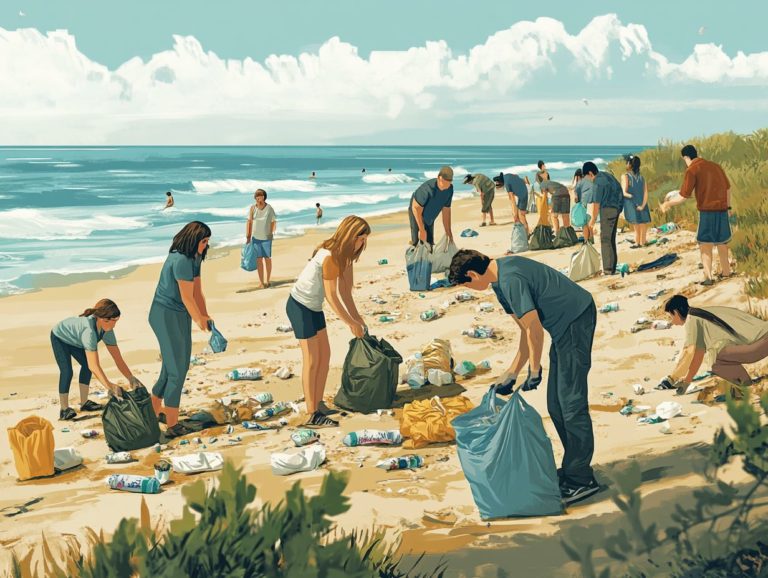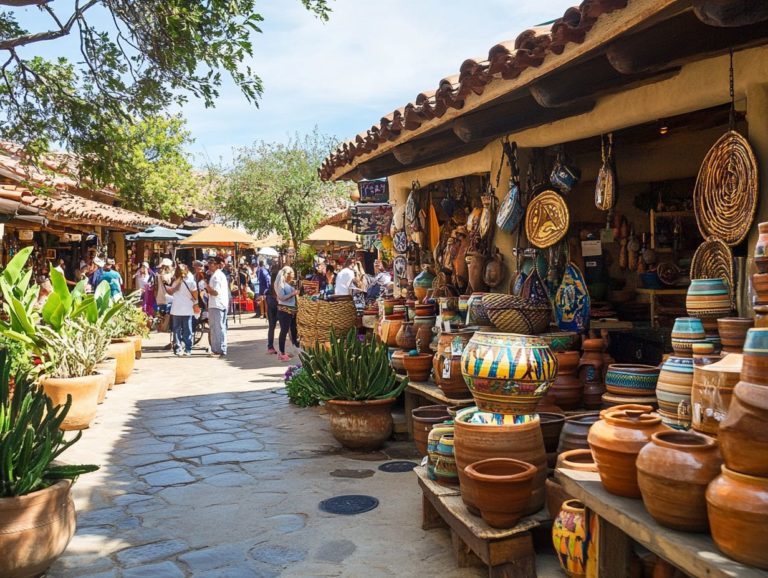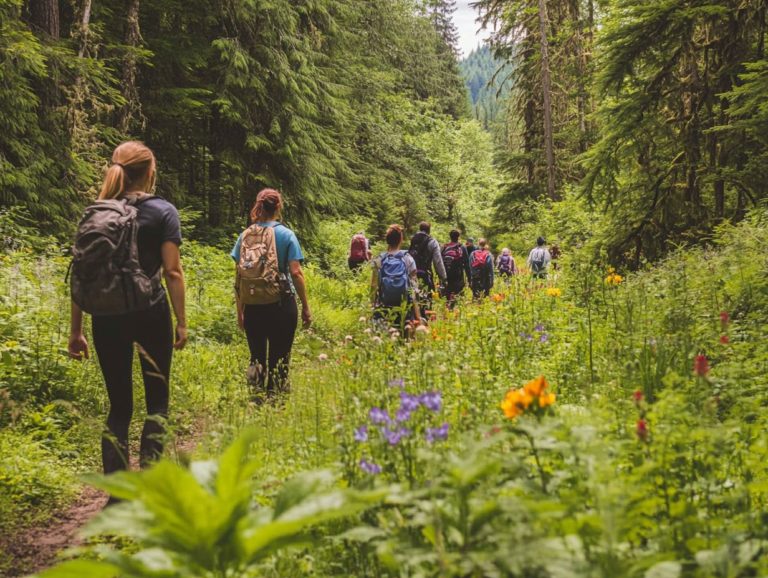How to Experience Wildlife Responsibly
Nature is under threat from human activity. Understanding responsible wildlife engagement is crucial, especially for ethical tourism.
This guide delves into what defines responsible wildlife experiences. It emphasizes their invaluable contributions to environmental conservation and education while highlighting the need to support local communities.
Act now to choose experiences that truly honor animal welfare and sustainability! Here are practical tips for maintaining responsible behavior during encounters, such as using binoculars for viewing.
You can also support organizations committed to wildlife protection and learn about the importance of being aware of wildlife exploitation.
Join us on this journey to make your wildlife interactions not just exciting, but also ethical and enriching! Together, we can ensure a brighter future for wildlife.
Contents
- Key Takeaways:
- Understanding Responsible Wildlife Experiences
- Benefits of Responsible Wildlife Experiences
- Choosing Responsible Wildlife Experiences
- Practicing Responsible Behavior During Experiences
- Supporting Responsible Wildlife Organizations
- Frequently Asked Questions
- What does it mean to experience wildlife responsibly?
- Why is it important to experience wildlife responsibly?
- What are some ways to experience wildlife responsibly?
- Can I take photos or videos of wildlife while experiencing them responsibly?
- How can I educate others about responsible wildlife experiences?
- What should I do if I see someone not experiencing wildlife responsibly?
Key Takeaways:
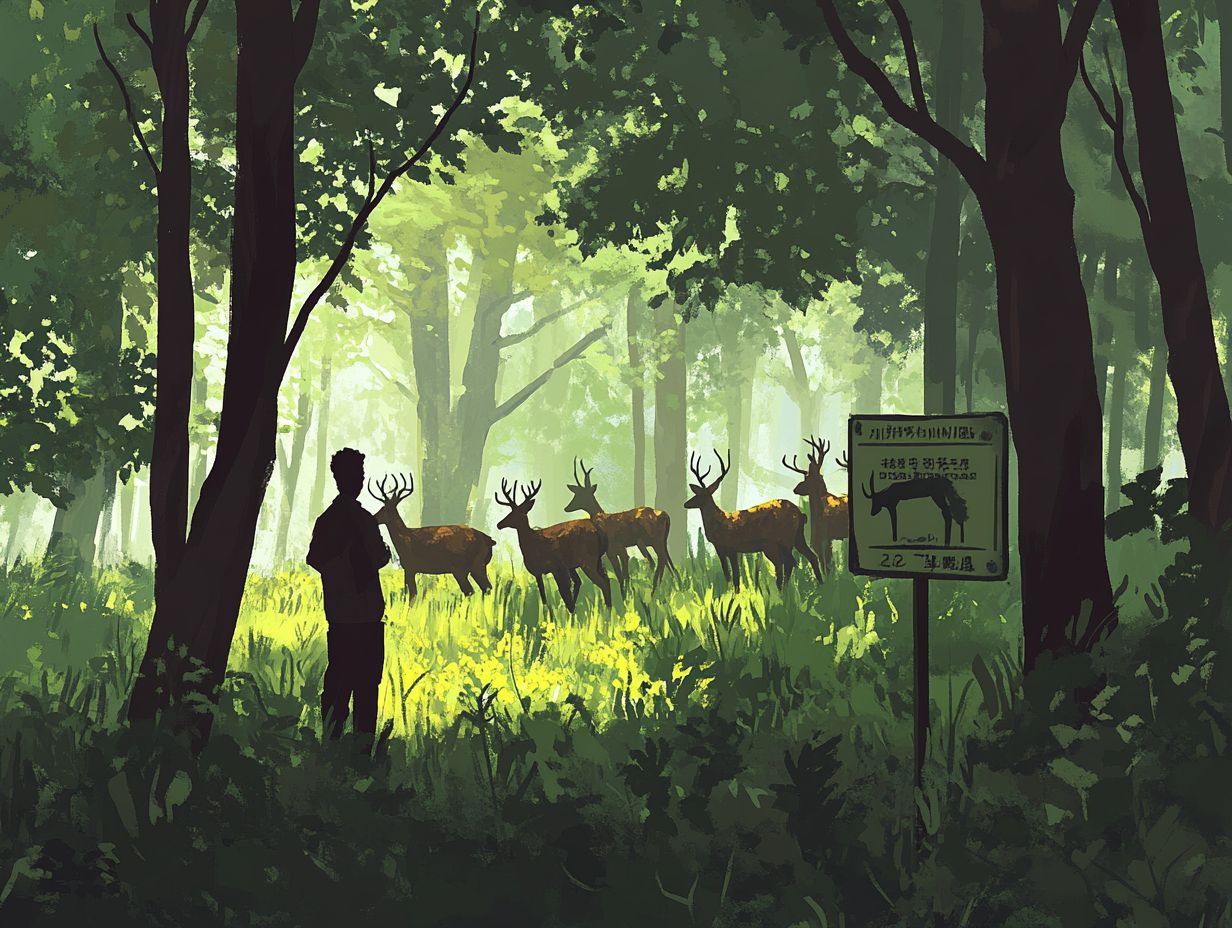
- Responsible wildlife experiences involve ethical and sustainable interactions with animals in their natural habitats while avoiding activities that harm their natural behaviors.
- These experiences benefit the environment and promote education and conservation efforts, encouraging travelers to educate themselves and others.
- To experience wildlife responsibly, research and evaluate options, practice responsible behavior, and support responsible organizations through donations and volunteering, including ethical elephant experiences.
Understanding Responsible Wildlife Experiences
Understanding responsible wildlife experiences is essential in today s world, where ethical wildlife tourism has become increasingly important, particularly in places like Southeast Asia. Encounters must prioritize animal welfare and conservation.
As a traveler, you play a vital role in ensuring that your interactions with wildlife do not disturb their natural behaviors and habitats. Be sure to choose tour operators that prioritize ethical practices in wildlife tourism, ensuring your adventures contribute positively to the ecosystems you explore.
By focusing on observing animals in their natural environments, you not only help preserve wildlife but also educate yourself and others about sustainable practices, while making responsible decisions that protect natural habitats.
Defining Responsible Wildlife Experiences
Responsible wildlife experiences are about engaging in interactions that champion ethical animal encounters and uphold conservation principles, ensuring that animals behave naturally and minimizing human contact.
When you participate in these experiences, you re prioritizing the welfare and natural behaviors of animals, steering clear of situations that could exploit or harm wildlife. Being aware of wildlife exploitation helps you make better choices that respect ecosystems and the humane treatment of animals, as well as understanding ethical practices in wildlife.
Engaging in ethical interactions means committing to minimizing your impact while cultivating a genuine appreciation for biodiversity. By embracing practices that benefit both animals and their habitats, such as following national park guidelines, you re helping ensure a thriving environment for generations to come.
Benefits of Responsible Wildlife Experiences
Engaging in responsible wildlife experiences brings a wealth of benefits that go far beyond mere enjoyment. By opting for ethical wildlife tourism, you not only play a role in environmental conservation but also actively support efforts that protect endangered species and their habitats, engaging in activities such as whale watching and bird watching.
These experiences cultivate a deeper understanding of how human activities influence flora and fauna. They instill a culture of respect and responsibility among travelers. Furthermore, by educating yourself and sharing this knowledge with fellow travelers, you can contribute to a more sustainable approach to wildlife tourism. For example, learn about how to respect local wildlife while traveling, ensuring that your adventures leave a lasting positive impact on flora and fauna.
Environmental Conservation and Education
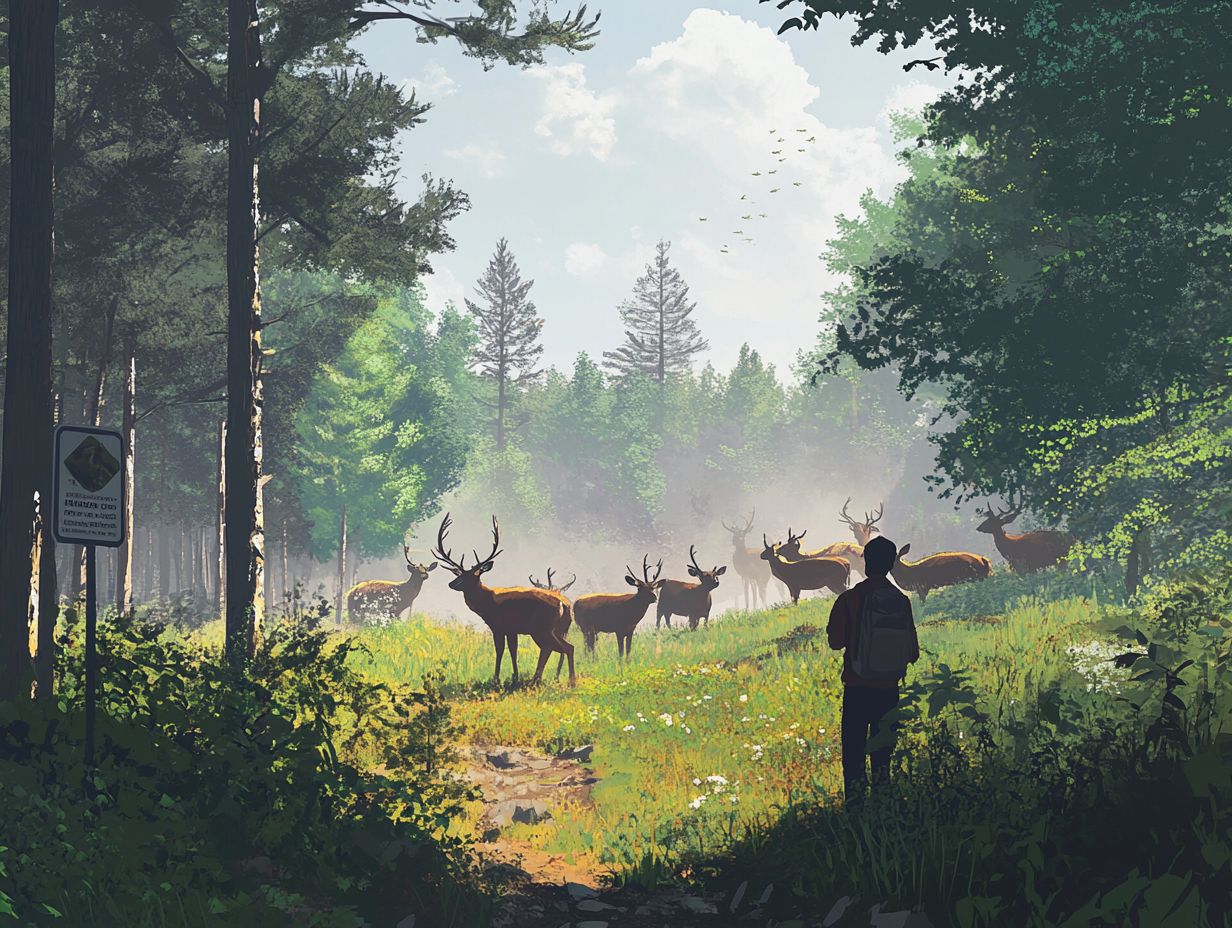
Environmental conservation and education are essential elements of responsible wildlife tourism, creating a profound connection between you and the natural world. This includes understanding the impact on local communities.
By immersing yourself in eco-friendly tourism experiences, including visits to national parks, you gain invaluable insights into local ecosystems and species. You will discover the delicate balance that sustains them. This awareness enhances your enjoyment of the journey and nurtures a sense of stewardship toward the environment.
Wildlife tourism significantly supports local communities by channeling financial resources into conservation organizations. When you engage with local guides and participate in conservation projects, you contribute to preserving habitats and the livelihoods of those who rely on these natural treasures. Your responsible decisions support conservation efforts.
Choosing Responsible Wildlife Experiences
Choosing responsible wildlife experiences requires careful thought and thorough research to ensure that operators genuinely prioritize animal welfare and conservation. By reviewing travel suppliers and checking their reputations, you can identify organizations that uphold ethical practices in wildlife tourism.
This is crucial when seeking ethical elephant encounters, engaging in activities like whale watching, or bird watching. Make sure to avoid wildlife souvenirs. By making informed choices, you can learn how to respect wildlife while traveling, enabling you to select tours that resonate with your values and contribute meaningfully to wildlife preservation.
Researching and Evaluating Options
Researching and evaluating options is essential when selecting responsible wildlife experiences. Ensure your choices align with ethical practices and contribute meaningfully to conservation efforts, while also considering potential red flags.
As you plan your adventure, understanding the influence of your chosen travel suppliers on local ecosystems is crucial. Check their reputations through reviews and certifications that highlight sustainable practices, ensuring responsible decisions.
It’s vital to assess how suppliers interact with flora and fauna, as some practices can adversely affect wildlife habitats. By examining parameters like animal welfare and community involvement, you can make informed decisions that prioritize conservation and ensure humane treatment of animals.
Engaging with wildlife tourism responsibly enriches your personal experiences and plays a vital role in protecting endangered species and their environments. Remember to follow leave no trace principles and consider tips for sustainable wildlife tourism, which means leaving nature as you found it.
Practicing Responsible Behavior During Experiences
Practicing responsible behavior during wildlife experiences is essential for ensuring the safety and well-being of both animals and their habitats. Being mindful of your actions can make a huge difference!
To genuinely appreciate wildlife, it’s vital to maintain a respectful distance and use tools like binoculars for observation. Avoid human contact and loud noises, which can disturb wildlife. By adopting these practices, you contribute to the preservation of wildlife and honor their natural environments. For more insight on this topic, check out responsible wildlife tourism, while reveling in the beauty of observing animals in their habitats.
Your choices can make a real difference! Together, we can ensure the survival of wildlife and their beautiful environments.
Tips for Interacting with Wildlife
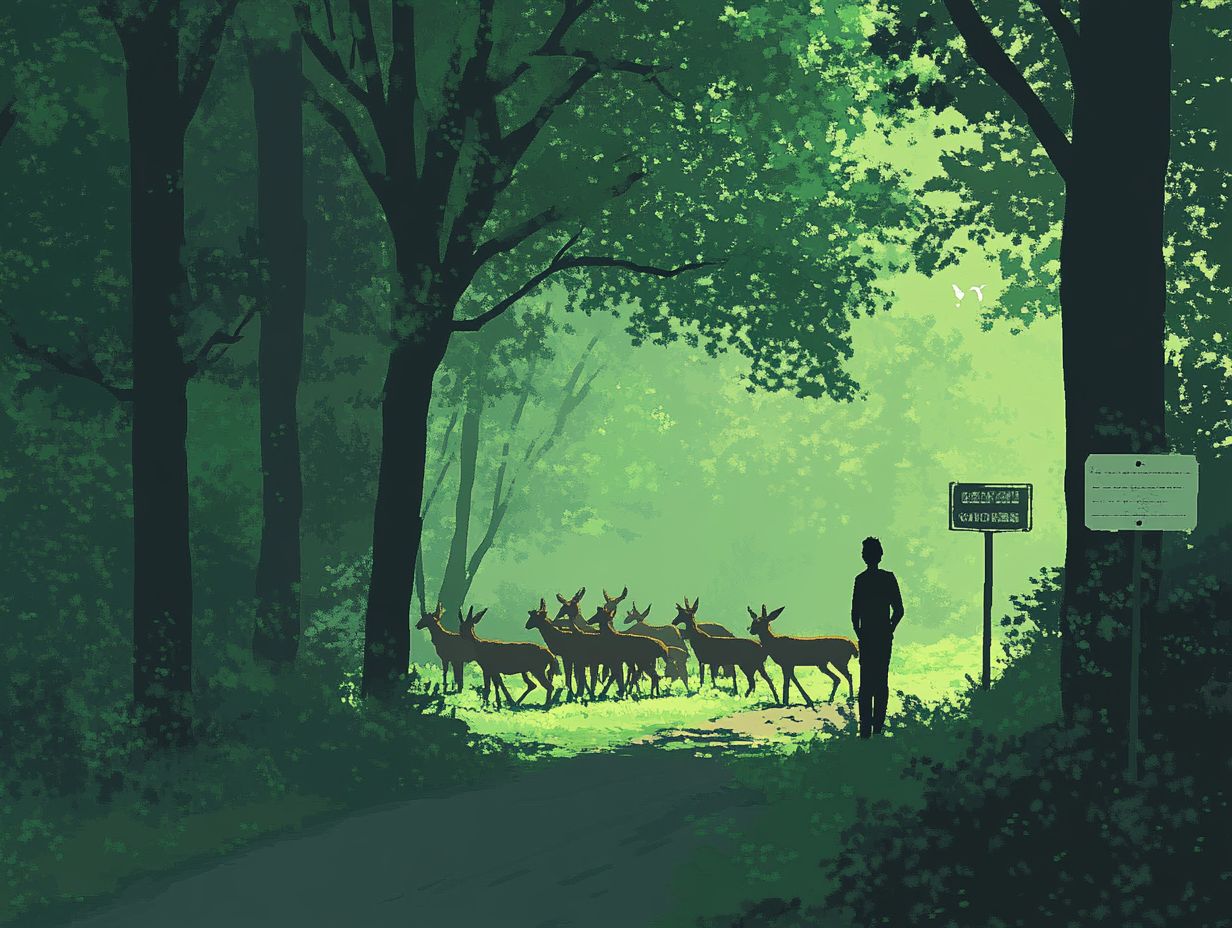
When interacting with wildlife, it s crucial to follow specific guidelines to ensure that your presence doesn t disrupt their natural behaviors. Be mindful of how you approach these amazing animals, placing their comfort and safety above all else.
Practice ethical photography by taking pictures in a way that does not harm or scare the animals. Maintain a respectful distance, allowing animals to carry on with their activities undisturbed.
Loud noises can startle wildlife and drive them away from their habitats. Keep conversations hushed and minimize boisterous behavior. If you re interested in capturing wildlife through photography, avoid flash photography and actions that could cause harm or distress.
By embracing these simple steps, you can enjoy observing wildlife while ensuring their well-being is safeguarded and contribute to conservation efforts.
Leave No Trace Principles
The Leave No Trace principles serve as essential guidelines for anyone engaging in responsible wildlife tourism. These principles ensure your activities have a minimal impact on the environment while respecting the natural habitats of wildlife.
When watching wildlife, maintain a respectful distance, allowing animals to exhibit their natural behavior without disturbance. For more information, check best practices for wildlife tourism. When hiking, consciously choose established paths to help minimize soil erosion and protect plant life, all while following national park guidelines.
Always remember to pack out what you bring in, including food scraps and trash. This simple act prevents pollution and avoids inadvertently feeding wildlife, which can disrupt how animals find food naturally and leads to the necessity of keeping wildlife wild.
Educating yourself about local ecosystems enhances your experience and deepens your appreciation for the intricate connections within nature. This understanding allows you to observe animal behaviors and recognize the vital role of biodiversity.
Supporting Responsible Wildlife Organizations
Supporting responsible wildlife organizations is a crucial way to contribute to conservation efforts and help safeguard vulnerable species and their habitats. When you donate to conservation groups or volunteer at wildlife sanctuaries like Trunks & Leaves or GREAT Travel, you can make a genuine impact on wildlife preservation.
Your donations provide crucial support that makes a real difference! They supply essential resources for these organizations while enhancing awareness and education regarding wildlife conservation initiatives.
By engaging with these groups, you foster a sense of responsibility and promote sustainable practices within your community.
Donating and Volunteering Opportunities
Donating and volunteering with wildlife organizations provide meaningful avenues to positively impact wildlife conservation while supporting local communities.
These opportunities extend from funding habitat restoration projects to engaging in community outreach initiatives aimed at educating the public about biodiversity. Many wildlife organizations actively seek volunteers for hands-on tasks like wildlife monitoring and rehabilitation efforts.
Your contributions help conserve endangered species and strengthen the connection between communities and their natural environments.
Frequently Asked Questions
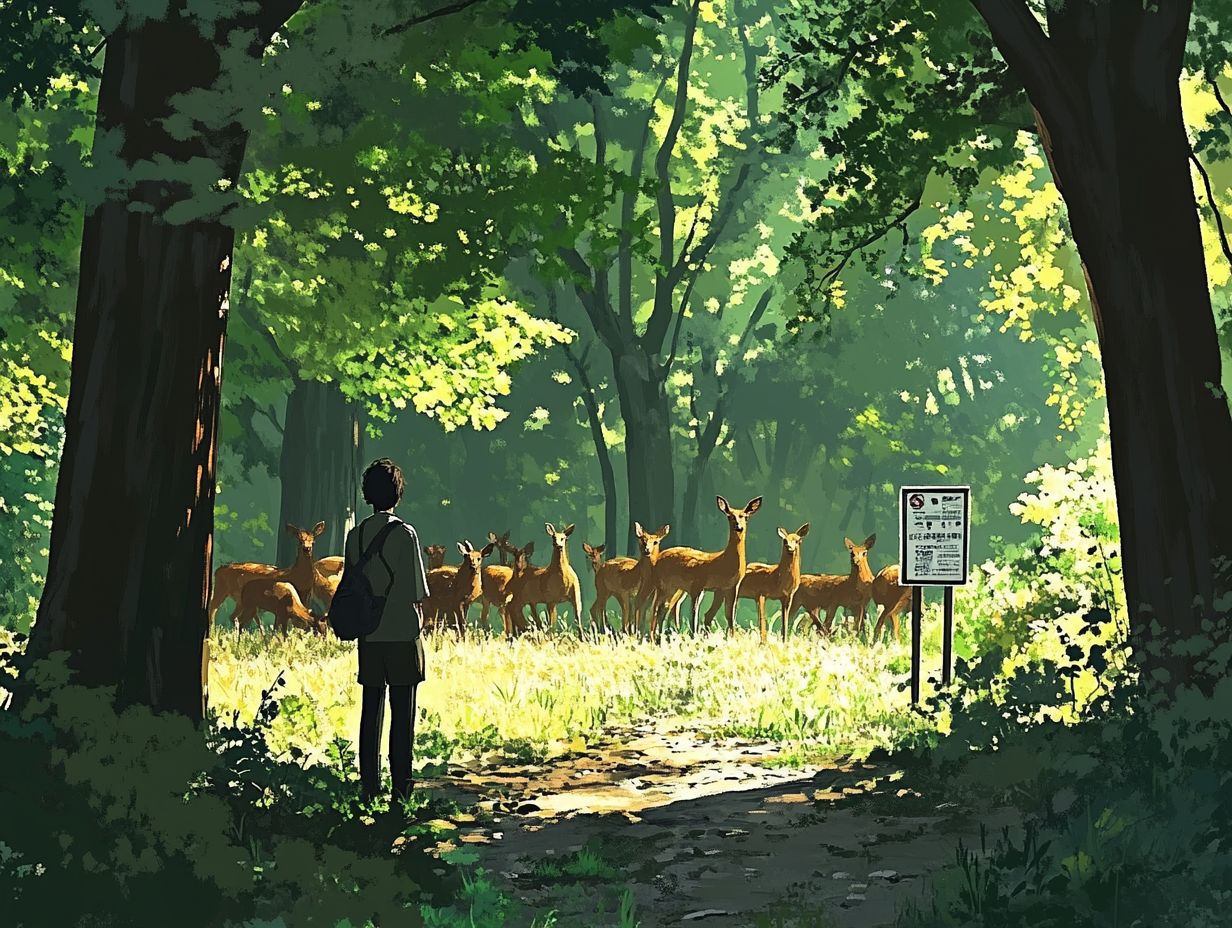
What does it mean to experience wildlife responsibly?
Experiencing wildlife responsibly means appreciating and enjoying wild animals and their natural habitats without causing any harm or disturbance to them or their environment.
Why is it important to experience wildlife responsibly?
Experiencing wildlife responsibly is crucial. It helps protect animals and their habitats for future generations.
Irresponsible behavior can negatively impact their well-being and threaten their survival.
What are some ways to experience wildlife responsibly?
- Follow all posted rules and regulations.
- Keep a safe distance from the animals.
- Do not feed or touch them.
- Avoid loud noises or sudden movements.
Can I take photos or videos of wildlife while experiencing them responsibly?
Yes, you can take photos and videos of wildlife as long as you do not disturb or harm them. Use gentle ways to capture memories, avoiding flash and loud noises.
How can I educate others about responsible wildlife experiences?
You can educate others by setting a good example. Follow all guidelines yourself and spread awareness through social media or word of mouth.
Support organizations and programs that promote responsible wildlife tourism. Join the movement for responsible wildlife experiences today!
What should I do if I see someone not experiencing wildlife responsibly?
If you spot someone acting irresponsibly, take action! A friendly reminder can make a difference.
If the behavior continues, report it to the appropriate authorities or organizations managing the area.

